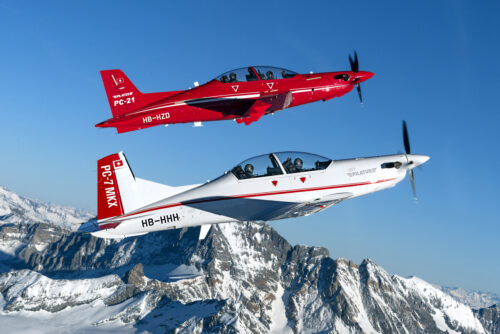Pilatus has secured a significant win with the Royal Netherlands Air Force choosing its PC-7 MKX training system as the cornerstone of their basic training program. This contract, which includes eight aircraft and associated training systems, is slated to deliver the first aircraft from the first half of 2027. The PC-7 MKX platform is based on the PC-7 Mk II, which has a well-established reputation for reliability. Netherlands becomes the launch customer of the PC-7 MKX with the contract signing.

Photo: Pilatus
The selection of Pilatus follows a public invitation to tender issued by the Dutch Procurement Authority, “Material & IT Command” (COMMIT). This acquisition reflects the Dutch Ministry of Defence’s confidence in the PC-7 MKX’s ability to impart essential flying skills, while simultaneously preparing pilots for the rigors of advanced training.
The PC-7 MKX is not just another trainer; it represents a leap forward in basic flight training technology, with a cockpit that boasts a three-display philosophy using the latest generation of high-definition screens, providing student pilots with an easy entry point into the world of modern avionics, while allowing them to hone vital flying skills using a forgiving and highly capable airframe. The ground-based training system is equally impressive, incorporating advanced Virtual Reality (VR) components, interactive wallboards, and VR modules, designed to create a more immersive and hands-on learning environment. The aircraft itself boasts a 700 shaft horsepower engine and a top speed of 300 knots. It features Martin Baker ejection seats and a Pratt & Whitney Canada engine, and is constructed using a lightweight aluminum structure and a robust undercarriage.
A key element of the PC-7 MKX package is Pilatus’ advanced Training Management System, which features Mission Planning and Mission Debriefing tools. Previously reserved for advanced training stages, these tools are now being deployed earlier in the learning process. By granting student pilots and instructors access to operational insights and performance analytics, the system enhances situational awareness and accelerates learning, thereby smoothing the transition into more complex aircraft and mission profiles. The increased role for flight simulators is also noteworthy, as they are expected to reduce the number of aircraft required for training, further enhancing the system’s cost-effectiveness.
According to the Dutch Ministry of Defence, the new acquisition is an extension of a long and fruitful relationship with Pilatus, one that will last another 30 years: “We have had a long and good relationship with Pilatus. With the contract signing for a state-of-the-art learning environment we are extending this partnership for another 30 years.” The relationship between the RNLAF and Pilatus began in 1988 with the acquisition of the PC-7 trainers. The new PC-7 MKX system is intended to replace the aging PC-7 fleet, and will be based in Woensdrecht in the south of the Netherlands.
Markus Bucher, CEO of Pilatus, expressed his delight at the contract win: “We’re delighted to announce this contract for our new PC-7 MKX training system and we thank Holland for its decision! This marks the beginning of a new era of basic flight training in the Netherlands, which – I am sure – will set a new standard that other air forces will seek to follow.”
Ioannis Papachristofilou, Vice President Government Aviation at Pilatus, added: “This contract will see us bring our brand-new PC-7 MKX into service together with a comprehensive suite of training aids designed and developed by Pilatus to ensure seamless integration of the training system. We look forward to working closely with the Koninklijke Luchtmacht and are honored by their longstanding confidence in Pilatus.”
Pilatus says it is currently engaged in additional tenders related to their new basic trainer, indicating that the PC-7 MKX may soon be adopted by other air forces around the globe.
For more information, hit the Source below